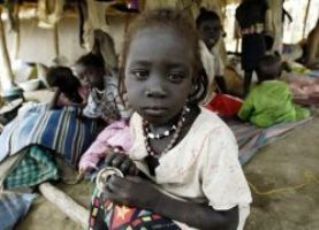UN warns more IDPs from Abyei should wait in camps till next year
By Ngor Arol Garang
July 23, 2009 (ABYEI) — While Abyei Internally Displaced Persons (IDPs) continue to return from camps to their homes in Kech (Difra), and other northwest areas of Abyei, the UN Children’s Fund (UNICEF) warns that more displaced could remain displaced until next year.

Speaking to reporters today in Agok, UNICEF emergency officer, Heaven Johnson said everybody is hoping people come back to their villages as soon as possible now that the dispute over Abyei town and its surrounding is settled.
“At the same time we also believe it would be prudent to assume that by September over one thousand could have gone back and that we would still have four thousand displaced through the year,” added Johnson, who recently visited Agok, south of Abyei.
He further said hundreds of children were at risk of not attending schools last year, mainly due to the destruction of school buildings by the military personnel in Abyei and the fact that some schools were used to shelter soldiers and IDPS in other villages.
However, Arop Matiok, from the emergency response unit of the Abyei administration said 507 families had returned as of 15 July.
“We are now beginning the process of repatriating people housed in schools as many of those from camps have returned,” he said.
But, he was quick to add that families wishing to return have many concerns.
In Agok, the school that housed the largest number of IDPs has already been closed and two more would be shut down soon as residents vacate them.
“The school my daughters attended in our village in Abyei was destroyed last year. It has not re-opened. If we go back now, they could miss a whole year, said Awut Deng an IDP staying with her small brother currently studying at Agok primary school.
She said her father had suggested the children be enrolled at a school in Agok.
According to local reports, between 30 and 50 schools across Abyei particularly for girls were destroyed by militants in Abyei after May clash between SPLA and SAF.
GOSS President Salva Kiir Mayardit when he visited Abyei on July 9 promised that his government would embark on developmental plans using unity development funds. Also, children have already started going back to schools in Abyei this year.
But, many residents remain skeptical and say there is so much to be done here. “Everything is in ruined and it will take months and years for life to return to normality, said Arop Ayiik, 50, a businessman who has been in the area even after the destruction.
Earlier, Heaven said people who are still in camps would need continued humanitarian support. The international response had been insufficient and it was host communities who had offered the bulk of support to IDPs, he added.
However,” these hosts are now anxious that their guests return to their own homes. It has been a big strain to support additional people. We want them to return now,” said Awut Arop Kuol who sells tea in Agok town and has been hosting her relatives from Abyei since 15 May 2008.
Earlier, Heaven, said apart of education, IDPs continue to worry about food security and other related issues. Although government of Southern Sudan purchased sorghums to support hunger stricken region this year, to support returning families, residents say little is being done.
They also say local prices of basic items are very high. There are frequent shortages and it is hard to manage.
(ST)
